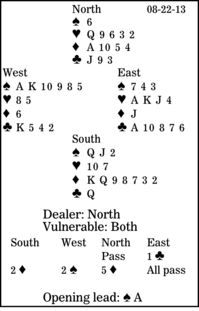Bridge column, August 22: The logic of the auction

Sometimes, though, the logic of the auction makes it clear which side is sacrificing. Then the other pair, if not bidding higher, must extract as much as possible by doubling for penalty.
What do you think about the auction in today's deal?
North's pass and East's one club were clear-cut. Then South was wimpy in not bidding three diamonds. Yes, her partner was a passed hand and she was vulnerable -- so what?
West's two-spade response promised 10-plus points. Then North compensated for his partner, leaping to five diamonds. This, in theory, contravened the Law of Total Tricks, because he could assume only a 10-card fit, so should have settled for four diamonds. But he thought the opponents could make at least four spades and wanted to be as big a nuisance as possible. He was pleasantly surprised when there were three passes.
East passed because he was happy to hear his partner bid five spades. But West should not have passed. She knew her side had the balance of points and should have doubled or bid higher.
Five diamonds went the obvious down two. But minus 200 was very cheap when compared with the easy game available the other way. And with great guessing, East-West could make six clubs or six spades.
As Zia Mahmood says, "If you never double a making contract, you are not doubling often enough." Do not let the opponents steal the pot.
** ** **
COPYRIGHT: 2013, UNITED FEATURE SYNDICATE
DISTRIBUTED BY UNIVERSAL UCLICK FOR UFS

